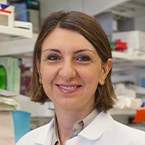AACR-MPM Oncology Charitable Foundation Transformative Cancer Research Grant
The AACR-MPM Oncology Charitable Foundation Transformative Cancer Research Grants support early- to mid-career investigators employing highly innovative approaches to major problems or challenges in cancer research. Funded projects are expected to have a potentially transformative impact on future clinical practice.
2022 Grantees

Research
Metastasis is a complex multi-step process, during which, tumor cells must profoundly alter their metabolism to adapt to the differing environments they encounter. Although metastatic seeding of specific organ sites can predict disease severity and patient prognosis, the molecular logic underlying when and to which organ a tumor cell will metastasize remains unclear. Dr Perera’s lab is set to explore the metabolic features within the primary tumor that define which secondary tissue a metastatic cell will ultimately colonize. Using innovative mouse models that enable metabolite profiling of tumor cells and their organelles, Dr Perera aims to discover master regulators that promote metastasis, and manipulate these drivers to disable the aggressive features of metastatic pancreatic ductal adenocarcinoma.
Biography
Rushika M. Perera PhD is the recipient of the NIH Director’s New Innovator Award, the Damon Runyon-Rachleff Innovation Award, the AACR NextGen Star Award and the 2021 Gunter Blobel Early Career Award of the American Society for Cell Biology. She is currently an Associate Professor in the School of Medicine at the University of California, San Francisco. Her research program seeks to understand how metabolic organelles such as the lysosome contribute to cellular plasticity and adaptation to stress, with a focus on pancreatic cancer.
Acknowledgement of Support
The AACR-MPM Transformative Cancer Research Grant provides us with a unique opportunity to pursue a new line of research at the interface of cell biology, metabolism and cancer biology. I am incredibly grateful to the AACR and MPM for supporting our ideas and research goals.

Research
Mutant transcriptional machineries have been found to form transcriptional condensates. While wild type nucleophosmin1 (NPM1) forms liquid-liquid phase separation (LLPS) at the nucleolus, mutant NPM1 (NPM1c) moves to the cytoplasm and forms smaller puncta dots in the nucleus. Dr. Zhang and his research group uncovered a neomorphic, transcriptional-amplifier function of NPM1c on chromatin that sustains a pathogenic leukemia transcription program. With this AACR grant, they seek to use state-of-art comprehensive approaches to address the fundamental question of transcriptional dysregulation in cancer.
Biography
Dr. Xiaotian Zhang obtained his Bachelor’s degree in Biological Sciences from Fudan University in Shanghai. He obtained his Ph.D. in Molecular Human Genetics at Baylor College of Medicine. After a stint at the Van Andel Institute for a three-year special fellowship, he was appointed as a research investigator in the University of Michigan. Dr. Zhang is currently a tenure-track assistant professor in the Department of Biochemistry and Molecular Biology at the University of Texas Health Science Center at Houston.
Acknowledgement of Support
I want to thank AACR and MPM Oncology Charitable Foundation for the Transformative Cancer Research Grant, on behalf of a team that consists of a cancer biologist and biophysicist. This award will greatly enhance the existing collaboration of this exciting team that is focused on the condensate formed by mutant NPM1 in acute myeloid leukemia.
2021 Grantees

Research
Recurrent hotspot somatic mutations in genes encoding splicing factors (SFs) are very commonly found in myelodysplastic syndrome (MDS) and in other cancers at varying frequencies, but remain undruggable and the mechanisms by which they drive malignancy remain elusive. Dr. Papapetrou’s lab recently discovered a novel convergent effector of SF mutations, a long isoform of GNAS (the gene encoding the alpha subunit of the stimulatory G protein, G⍺s), as a novel target for MDS and other SF-mutant cancers. They aim to investigate G⍺s as a therapeutic target and evaluate therapeutic interventions that inhibit signaling downstream of its long form (G⍺s-L) using iPSC-derived and primary MDS cells in in vitro and in vivo functional assays.
Biography
Eirini Papapetrou, MD, PhD, is an Associate Professor of Oncological Sciences at the Icahn School of Medicine at Mount Sinai. Her research program seeks to uncover new disease mechanisms and therapeutic targets for myeloid neoplasms. Her laboratory pioneered the development of iPSC models of myeloid malignancies. Dr. Papapetrou is the recipient of several awards, including the American Society of Gene and Cell Therapy Outstanding New investigator Award, Damon Runyon-Rachleff Innovation Award, Pershing Square Sohn Prize and is an elected member of the American Society for Clinical Investigation.
Acknowledgement of Support
I am honored and grateful to receive this award, which will enable my laboratory to embark on a new and exciting direction in cancer biology of evaluating a new therapeutic target for cancers with splicing factor mutations.
2020 Grantees

Research
Dr. Buhrlage is set to develop a novel class of agents, bivalent deubiquitinase (DUB) proximity inducing molecules, that can selectively stabilize targeted proteins. This new drug development paradigm is enabled by her group’s recent success in developing selective DUB ligands for several members of the enzyme family.
Biography
Dr. Buhrlage completed a PhD in organic chemistry in 2008 at the University of Michigan and trained for two years in medicinal chemistry at the Broad Institute. Prior to joining as a faculty member in 2015, Dr. Buhrlage ran the medicinal chemistry core laboratory at Dana-Farber. She is currently an assistant professor in Dana-Farber’s Cancer Biology Department and Harvard Medical School’s Biological Chemistry and Molecular Pharmacology Department. Her research group focuses on the development of small molecule modulators of deubiquitylating enzymes (DUBs) for cancer therapy.
Acknowledgment of Support
I’d like to sincerely thank the AACR and MPM for the opportunity to pursue this “high-risk, high-reward” research project. As an early career investigator, the chance to pursue this type of project could propel my career. We will pursue the research aggressively and are optimistic we’ll credential a new cancer treatment paradigm.